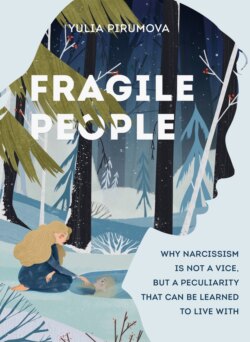Читать книгу Fragile People: a Hidden Door into the World of Narcissists - Юлия Пирумова - Страница 14
Introduction
A crown as protection against vulnerability
ОглавлениеWhen I was thinking of writing a book on narcissists, I feared that, like many other works on that subject, it would be filled with denouncing and condemning intonation. I really wish more and more people would see the inner world of narcissists, feel how it is to live with such type of character. What is more, my aim is to help people who recognize themselves in the questionnaire to better adapt to life and adjust to living with their special features. I seriously believe that narcissism is not worse (and not better) than other personality organizations. It is just that our means of protecting our most fragile area are different.
I believe you would agree that all people protect their fragility using different means. Those who have a schizoid type personality hide from people, going further away so as not to be seen and offended. Representatives of the histrionic personality type seduce in order to provide themselves with a relationship in which they will be loved. A masochist pretends to be weak and is able to not only feel safe by doing so but also enjoy it. A narcissist has laid a wager on protecting their fragile self-esteem. And for this purpose, they needed “a crown”. Well, yes! When it is so empty and turbulent inside, one might decide to inflate a bubble of importance and grandiosity on the outside and pay no attention to people.
Every one of us wants to be good for ourselves and others. Everyone wants to be liked and loved by other people. Each of us has a core inside, around which our personal kingdom of value and significance is shaped. It does not appear by itself but blooms like a garden when it is being well looked after. A person's “self” is born in conditions of attachment to close ones, dependence on adults, care and love from the dearest people. If a child is not loved, forced to grow up faster and not emotionally nurtured, of course, they will grow up physically. But they will always adapt to such attitude, acquiring particular qualities of the character… Narcissists are those who did not receive a chance to feel themselves valued and significant. They were so heavily and so early wounded in the fields of love and affection that they were forced to eliminate these very desires in themselves. Since then, they live like that: with great, sometimes even grandiose external ambitions and claims to be significant, while at the same time staying very fragile inside. And it is not about weakness or special inability to adapt to life. It is just because they grew up too early in the conditions of insufficient resources.
Ever since, they are bound to live:
• without sufficient inner supports;
• without clear understanding who they are and what they are like;
• without relying on attachment and dependence on people.
At the same time, they demand from themselves to bravely, wisely and maturely cope with their life on their own. But the truth is that they are objectively not ready for such deeds, since deep inside they remain underloved and ungrown small children. Yet still, they demand Aristotle's wisdom, Kutuzov's bravery, and Napoleon's cheek from themselves. They demand power from themselves so as not to see themselves powerless again. Just like back then, in their childhood…
We are used to seeing monsters in narcissists. But deep inside, behind the protective carapace… “their souls are bleeding silently. They have suffered such collapses of 'self' that their suffering itself has collapsed. They emerge from them in psychic paralysis. They have nearly perished. Nevertheless, they are alive. Alive, but not for real; you can feel they are not of this world. They come to us covered by a protective cloak and a multitude of psychotic disorders, sometimes the other way round – in 'self' without skin, only having what to say about how unlucky they are to live, and, thus, even more touching. Sometimes they appear cowered within themselves, as if ashamed of their own suffering. Moreover, they know nothing about it, so dark and elusive it remains. We could think that most of all they are afraid of facing the bottomless abyss or losing a treasure so carefully protected that it has become almost inaccessible to them. They come to us almost without any hope. We meet them, sensing a shade of dark anxiety. It is true that it is hard to walk beside those who have survived. Will we be able to change anything in our psychoanalytic understanding in order to fully accept them?” – that is what a famous French psychoanalyst P.C. Racamier wrote in his book Suffering and Surviving in Paradoxes.
Further on, we will try to touch upon experience, reality, and the feelings of narcissists. In order to understand that narcissism is not just a diagnose, it is also a wide range of human feelings, including pain, sadness, and anxiety.
